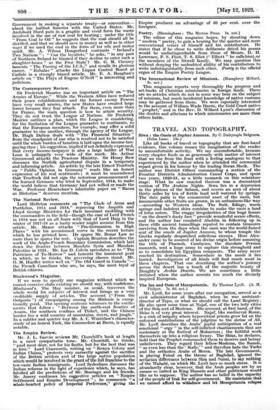TRAVEL AND TOPOGRAPHY.
Siwa : the Oasis of Jupiter Ammon. By C. Dalrymple Belgrave. (John Lane. 15s.) Like all books of travel or topography that are first-hand evidence, this volume rouses the imagination of the reader to uncomfortable activity. We say uncomfortable, because every chapter feeds us so generously with matter of interest that we rise from the feast with a feeling analogous to that experienced by the author when he attended the ceremonial repast given in his honour by the leading Siwan Sheik. The author was District Officer commanding a section of the Frontier Districts Administration Camel Corps, and spent two years, 1920-21, as a little monarch on this miniature stage. What he saw enacted thereon was a dramatized version of The Arabian Nights. Siwa lies in a depression in the plateau of the Sahara, and covers an area of about thirty miles by ten of fertile land well watered by springs. The date palm is the commercial asset of the oasis, but innumerable other fruits are grown, in an unbusiness-like way —according to Western ideas. The fruit, foliage, warm springs and indolent skies combine to make the oasis a land of lotus eaters. The craggy irregularities of this huge fissure " on the desert's dusty face " provide wonderful scenic effects, and the author has emulated Aladdin in following up in these cliffs ancient tunnellings reputed to contain treasures surviving from the days when the oasis was the world-famed seat of the oracle of Jupiter Ammon, to whose temple the Greeks regularly despatched solicitous envoys. Here Alex- ander came to be assured of his divine origin before assuming the title of Pharaoh. Cambyses, the dissolute Persian monarch, sent a huge army to capture this stronghold and so to consolidate his Egyptian conquests. The army never reached its destination. Somewhere in the sands it lies buried. Investigators of all kinds will find much meat in these chapters. That one describing the author's journey across the desert has a touch of the majestic beauty of Doughty's Arabia Deserta. We are sometimes a little irritated when the author accents too much the divinely inspired European.


















































 Previous page
Previous page